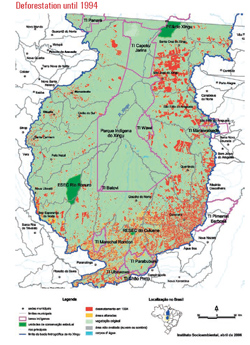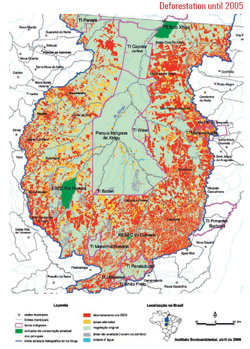Judge suspends Amazon dam project due to legal questions
Judge suspends Amazon dam project due to legal questions
mongabay.com
April 30, 2008
|
|
A Brazilian judge has issued a restraining order on a controversial dam in the Amazon basin, reports International Rivers, a conservation group.
In the decision, issued April 16 in response to a suit brought by the federal attorney’s office, Judge Antonio Carlos Almeida Campelo ruled that the government illegally awarded technical and economic feasibility and environmental studies for Belo Monte Dam to Brazil’s three largest civil construction companies. There was no competitive bidding process for the contract.
 Xingu watershed in 1994
|
At 11,181 megawatts, the Belo Monte Dam on the Xingu River would be the world’s third largest dam in terms of generating capacity. But the project has faced opposition from a coalition of indigenous groups, scientists, and environmentalists who say the dam will cause environmental harm by flooding large tracts of rainforest and blocking key migration routes for fish. To voice their concern over Belo Monte and other hydroelectric projects in the Amazon, more than 1,000 indigenous representatives are expected to gather in the city of Altamira from May 19-23. A protest last June saw the Enawenê Nawê, a tribe of around 450 members, block a major highway in the Brazilian state of Mato Grosso to protest the planned dams on the Xingu river.
The planned dam for the Madeira river has also seen widespread opposition. The 6,450-megawatt project, expected to be operational in 2012, will flood 204 square miles of rainforest. Researchers say the dams will release greenhouse gases from rotting vegetation and block important route for migratory fish, including some of the river’s largest catfish species. Environmentalists have warned that the project could bring soybean farmers, illegal gold miners and loggers to remote parts of the Amazon rainforest, increasing pressure on the biodiverse ecosystem.
The Brazilian government says the dams planned for the Xingu, Madeira, Tapajós, Tocantins, and other major tributaries of the Amazon, would provide most of Brazil’s electrical generating capacity over the coming decades. Much of the electricity would go towards energy-intensive mining, metal processing, and industrial farms in the Eastern Amazon.
International Rivers argues the more than 60 large dams planned for the Amazon in coming decades would “cause irreversible impacts to the rainforest, its wildlife, and local populations.”
